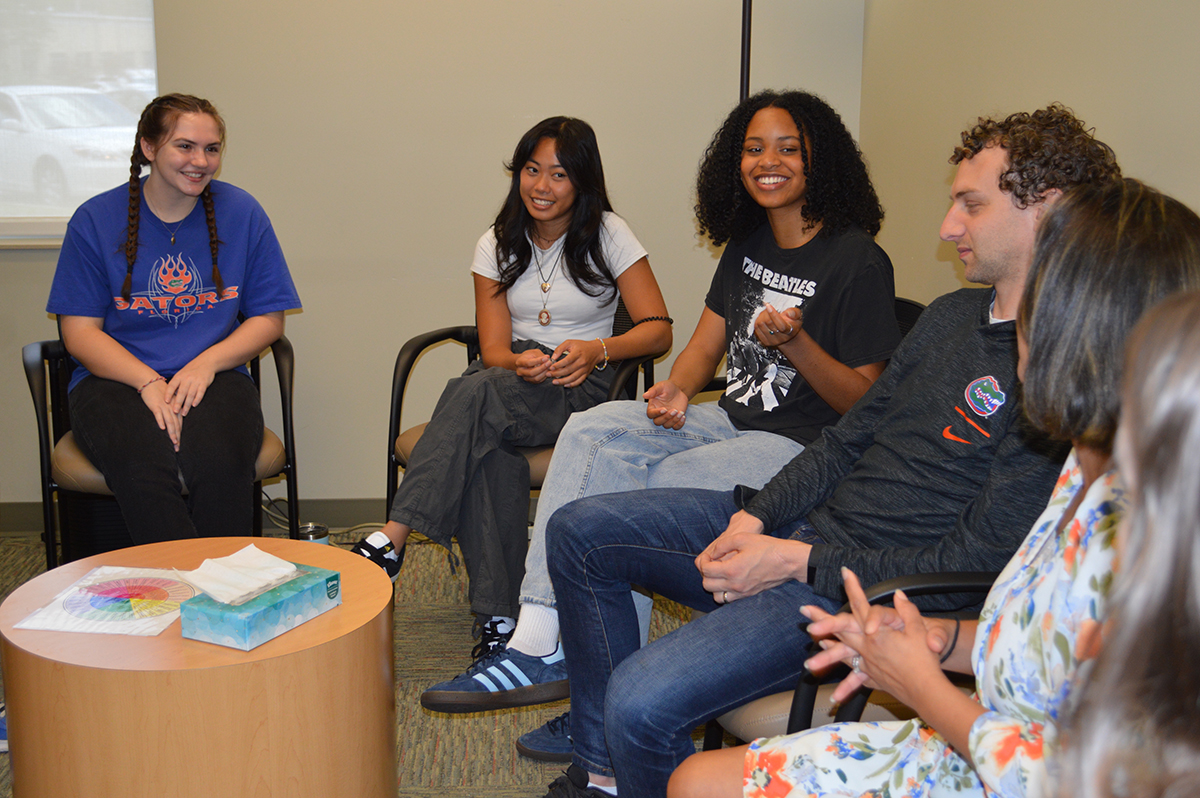
Are you looking for a supportive space to grow, connect, and thrive? The UF’s Counseling & Wellness Center (CWC) invites all enrolled students to explore our wide range of group counseling opportunities—designed just for you!
Whether you're navigating anxiety, depression, loneliness, isolation, life transitions, grief, or everyday stress, group counseling can be just as effective—if not more—than individual counseling. It’s a powerful way to gain insight, be inspired by each other’s growth, build resilience, and feel understood.
In a group of 4–10 students, facilitated by 1–2 CWC counselors, you’ll meet weekly for 1.5-2 hours in a brave, safe, and welcoming space. Together, you’ll share experiences, offer and receive support, and grow through meaningful conversations and connections.
College is a time of incredible personal growth—and you don’t have to go through it alone. Join a group and discover how healing, empowering, and inspiring group counseling can be!
HOW TO JOIN A CWC GROUP?
WAYS TO INITIATE GROUP SERVICES:
Schedule a brief consultation via phone by calling us at 352-392-1575. (M-F, 8AM-5PM)
Please note: The CWC works to serve as many students as possible; however, during high-volume times, we may have a waitlist for services.
Types of counseling groups we offer
As a student, if there is a counseling group you would want that we are not offering, let us know by completing this form, so we can work on providing you services that meet your needs!
Counseling groups are not drop-in meetings, so students participating in group counseling are expected to attend weekly throughout the semester.
Consistent with the International Accreditation of Counseling Services (IACS) and American Psychological Association (APA) accreditation standards, we provide group counseling services that are responsive to the culturally diverse student population. These standards require that, as counselors, we continue to develop and apply our awareness, knowledge, humility, sensitivity, understanding, and skills to work effectively with diverse groups and communities. Therefore, we offer population-specific groups facilitated by providers “who have the necessary and appropriate background and training, including multicultural competence, to meet the diverse needs of students” (IACS, 2023).
Below we include some of the types of groups we offer, primarily based on students’ needs and interests. Check it out!
UNDERSTANDING YOURSELF & OTHERS
These groups are about developing emotional awareness and self-understanding, building trust and connections, and enhancing relationships (friends, family, romantic, professional, etc.) through support and feedback.
Most of these groups are general and we also offer one for graduate students, one in Spanish, and another with music.
SKILLS & SUPPORT
These groups are about learning and practicing effective coping skills for specific concerns. Examples of some of these skills may include anxiety management, biofeedback, social skills, practicing self-compassion, distress tolerance and emotional regulation, coping with ADHD, and career concerns.
Some of these groups use nature, creativity, or dungeons and dragons games to teach skills.
WELLNESS SUPPORT
Support groups are about connecting with others who share similar lived experiences and/or identities in an empowering, supportive, and compassionate space. Students can be in community with others similar to them or who have experienced similar concerns (e.g., grief and loss, high sensitivity, OCD).
Some of these groups use puzzles, Dungeons and Dragon’s games, books, or are around horses to promote support.
We also offer one for graduate students and one in Mandarin.
LEARNING TOGETHER
Students participate in these groups through forms of engagement created within international movements of current or former mental health service users and facilitated by CWC faculty who share this lived experience as peers. A safe space to dialogue about whatever they are experiencing while respecting each other’s worldviews and choices, and move toward living in more creative, meaningful, engaged, and productive ways.
ALCOHOL & OTHER DRUGS (AOD)
These groups promote a safe, non-judgmental, and psychoeducational environment where students can discuss their substance use and gain understanding and perspective about their choices. Depending on the group, students may learn ways to practice use reduction or abstinence in a supportive space.

Take a Quiz
Finding the right support can make all the difference. Take our brief quiz to discover which groups may align best with your needs and goals! (Please note that the results of this quiz do not guarantee access to group counseling services.)
My Group QuizRemember that group counseling services are by referral only. Interested students need to speak with the BCR counselor or their ongoing counselor about participating in any of our groups.
